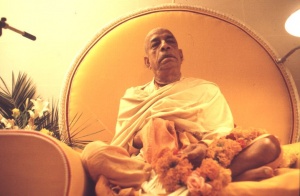CC Antya 1.120: Difference between revisions
No edit summary |
(Vanibot #0054 edit - transform synonyms into clickable links, which search similar occurrences) |
||
| Line 19: | Line 19: | ||
<div class="synonyms"> | <div class="synonyms"> | ||
''tuṇḍe'' | ''[//vanipedia.org/wiki/Special:VaniSearch?s=tuṇḍe&tab=syno_o&ds=1 tuṇḍe]'' — in the mouth; ''[//vanipedia.org/wiki/Special:VaniSearch?s=tāṇḍavinī&tab=syno_o&ds=1 tāṇḍavinī]'' — dancing; ''[//vanipedia.org/wiki/Special:VaniSearch?s=ratim&tab=syno_o&ds=1 ratim]'' — the inspiration; ''[//vanipedia.org/wiki/Special:VaniSearch?s=vitanute&tab=syno_o&ds=1 vitanute]'' — expands; ''[//vanipedia.org/wiki/Special:VaniSearch?s=tuṇḍa&tab=syno_o&ds=1 tuṇḍa]-[//vanipedia.org/wiki/Special:VaniSearch?s=āvalī&tab=syno_o&ds=1 āvalī]-[//vanipedia.org/wiki/Special:VaniSearch?s=labdhaye&tab=syno_o&ds=1 labdhaye]'' — to achieve many mouths; ''[//vanipedia.org/wiki/Special:VaniSearch?s=karṇa&tab=syno_o&ds=1 karṇa]'' — of the ear; ''[//vanipedia.org/wiki/Special:VaniSearch?s=kroḍa&tab=syno_o&ds=1 kroḍa]'' — in the hole; ''[//vanipedia.org/wiki/Special:VaniSearch?s=kaḍambinī&tab=syno_o&ds=1 kaḍambinī]'' — sprouting; ''[//vanipedia.org/wiki/Special:VaniSearch?s=ghaṭayate&tab=syno_o&ds=1 ghaṭayate]'' — causes to appear; ''[//vanipedia.org/wiki/Special:VaniSearch?s=karṇa&tab=syno_o&ds=1 karṇa]-[//vanipedia.org/wiki/Special:VaniSearch?s=arbudebhyaḥ&tab=syno_o&ds=1 arbudebhyaḥ] [//vanipedia.org/wiki/Special:VaniSearch?s=spṛhām&tab=syno_o&ds=1 spṛhām]'' — the desire for millions of ears; ''[//vanipedia.org/wiki/Special:VaniSearch?s=cetaḥ&tab=syno_o&ds=1 cetaḥ]-[//vanipedia.org/wiki/Special:VaniSearch?s=prāṅgaṇa&tab=syno_o&ds=1 prāṅgaṇa]'' — in the courtyard of the heart; ''[//vanipedia.org/wiki/Special:VaniSearch?s=saṅginī&tab=syno_o&ds=1 saṅginī]'' — being a companion; ''[//vanipedia.org/wiki/Special:VaniSearch?s=vijayate&tab=syno_o&ds=1 vijayate]'' — conquers; ''[//vanipedia.org/wiki/Special:VaniSearch?s=sarva&tab=syno_o&ds=1 sarva]-[//vanipedia.org/wiki/Special:VaniSearch?s=indriyāṇām&tab=syno_o&ds=1 indriyāṇām]'' — of all the senses; ''[//vanipedia.org/wiki/Special:VaniSearch?s=kṛtim&tab=syno_o&ds=1 kṛtim]'' — the activity; ''[//vanipedia.org/wiki/Special:VaniSearch?s=na&tab=syno_o&ds=1 na] u'' — not; ''[//vanipedia.org/wiki/Special:VaniSearch?s=jāne&tab=syno_o&ds=1 jāne]'' — I know; ''[//vanipedia.org/wiki/Special:VaniSearch?s=janitā&tab=syno_o&ds=1 janitā]'' — produced; ''[//vanipedia.org/wiki/Special:VaniSearch?s=kiyadbhiḥ&tab=syno_o&ds=1 kiyadbhiḥ]'' — of what measure; ''[//vanipedia.org/wiki/Special:VaniSearch?s=amṛtaiḥ&tab=syno_o&ds=1 amṛtaiḥ]'' — by nectar; ''[//vanipedia.org/wiki/Special:VaniSearch?s=kṛṣṇa&tab=syno_o&ds=1 kṛṣṇa]'' — the name of Kṛṣṇa; ''[//vanipedia.org/wiki/Special:VaniSearch?s=iti&tab=syno_o&ds=1 iti]'' — thus; ''[//vanipedia.org/wiki/Special:VaniSearch?s=varṇa&tab=syno_o&ds=1 varṇa]-[//vanipedia.org/wiki/Special:VaniSearch?s=dvayī&tab=syno_o&ds=1 dvayī]'' — the two syllables. | ||
</div> | </div> | ||
Latest revision as of 19:24, 19 February 2024

A.C. Bhaktivedanta Swami Prabhupada
TEXT 120
- tuṇḍe tāṇḍavinī ratiṁ vitanute tuṇḍāvalī-labdhaye
- karṇa-kroḍa-kaḍambinī ghaṭayate karṇārbudebhyaḥ spṛhām
- cetaḥ-prāṅgaṇa-saṅginī vijayate sarvendriyāṇāṁ kṛtiṁ
- no jāne janitā kiyadbhir amṛtaiḥ kṛṣṇeti varṇa-dvayī
SYNONYMS
tuṇḍe — in the mouth; tāṇḍavinī — dancing; ratim — the inspiration; vitanute — expands; tuṇḍa-āvalī-labdhaye — to achieve many mouths; karṇa — of the ear; kroḍa — in the hole; kaḍambinī — sprouting; ghaṭayate — causes to appear; karṇa-arbudebhyaḥ spṛhām — the desire for millions of ears; cetaḥ-prāṅgaṇa — in the courtyard of the heart; saṅginī — being a companion; vijayate — conquers; sarva-indriyāṇām — of all the senses; kṛtim — the activity; na u — not; jāne — I know; janitā — produced; kiyadbhiḥ — of what measure; amṛtaiḥ — by nectar; kṛṣṇa — the name of Kṛṣṇa; iti — thus; varṇa-dvayī — the two syllables.
TRANSLATION
“‘I do not know how much nectar the two syllables “Kṛṣ-ṇa” have produced. When the holy name of Kṛṣṇa is chanted, it appears to dance within the mouth. We then desire many, many mouths. When that name enters the holes of the ears, we desire many millions of ears. And when the holy name dances in the courtyard of the heart, it conquers the activities of the mind, and therefore all the senses become inert.’”